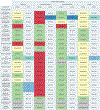Patient-Reported Outcome Measures for Health-Related Quality of Life in Patients With Psoriasis: A Systematic Review
- PMID: 38265774
- PMCID: PMC11096065
- DOI: 10.1001/jamadermatol.2023.5439
Patient-Reported Outcome Measures for Health-Related Quality of Life in Patients With Psoriasis: A Systematic Review
Abstract
Importance: Multiple patient-reported outcome measures (PROMs) for health-related quality of life (HRQL) exist for patients with psoriasis. Evidence for the content validity and other measurement properties of these PROMs is critical to determine which HRQL PROMs could be recommended for use.
Objective: To systematically review the validity of HRQL-focused PROMs used in patients with psoriasis.
Evidence review: Using PubMed and Embase, full-text articles published in English or Spanish on development or validation studies for psoriasis-specific, dermatology-specific, or generic HRQL PROMs were included. Development studies included original development studies, even if not studied in psoriasis patients per Consensus-Based Standards for the Selection of Health Measurement Instruments (COSMIN) recommendations. If a study included multiple diagnoses, more than 50% of patients had to have psoriasis or psoriasis-specific subgroup analyses available. Data extraction and analysis followed the COSMIN guidelines. Two independent reviewers extracted and analyzed the data, including PROM characteristics, quality of measurement properties (structural validity, internal consistency, cross-cultural validity, reliability, measurement error, criterion validity, construct validity, and responsiveness), and level of evidence. PROMs were classified into 3 levels of recommendations: (1) PROM recommended for use; (2) PROM requires further validation; and (3) PROM not recommended for use.
Findings: Overall, 97 articles were identified for extraction. This included 19 psoriasis-specific, 8 skin-specific, and 6 generic PROMs. According to COSMIN standards, most measures identified received a B recommendation for use, indicating their potential but requiring further validation. Only the Rasch reduced version of the Impact of Psoriasis Questionnaire (IPSO-11 Rasch) received an A recommendation for use given that it had sufficient content validity, structural validity, and internal consistency.
Conclusions and relevance: This study identified a significant lack of information concerning the quality of HRQL measures in psoriasis. This gap in knowledge can be attributed to the fact that traditional measures were developed using validation criteria that differ from the current standards in use. Consequently, additional validation studies in accordance with contemporary standards will be useful in aiding researchers and clinicians in determining the most suitable measure for assessing HRQL in patients with psoriasis.
Conflict of interest statement
Dr Pérez-Chada reported grants from National Psoriasis Foundation and the Group for Research and Assessment of Psoriasis and Psoriatic Arthritis and received honoraria as methodologist from the International Dermatology Outcome Measures outside the submitted work. Dr Hopkins reported authorship on 1 of the articles cited for Skindex-16 validation. No financial interests exist and he was not involved in the data extraction/risk of bias assessment for this article. Dr Armstrong reported research funding from AbbVie; scientific adviser, speaker, and personal fees from Almirall, personal fees from Arcutis, research funding from ASLAN; scientific adviser, speaker, and personal fees from Beiersdorf, data safety monitoring board fees from Boehringer Ingelheim, research funding and scientific adviser and speaker fees from BMS, Dermavant, Eli Lilly, Galderma, Incyte, Janssen, LEO Pharma, personal fees from Modernizing Medicine, research funding and scientific adviser fees from Nimbus, Novartis, Ortho Derm, data safety monitoring board fees from Parexel, research funding and Scientific adviser fees from Pfizer, Regeneron, Sanofi Genzyme, Sun Pharma, and UCB outside the submitted work. Dr Strand reported fees from AbbVie, Alpine Immune Sciences, Amgen, AstraZeneca, Bayer, BMS, Boehringer Ingelheim, Ermium, GlaxoSmithKline, Inmedix, Novartis, Pfizer, R-Pharm, Sandoz, Sanofi, Setpoint, Sorrento, Spherix, Scipher, UCB, and Urica during the conduct of the study. Dr Gottlieb reported grants from Alice B; honoraria as an advisory board member and consultant for Almirall, Amgen, AnaptysBio, Avotres Therapeutics, Boehringer Ingelheim, Bristol Myers Squibb, Dice Therapeutics, Highlight Therapeutics, Eli Lilly, Janssen, Novartis, Sanofi, UCB, and XBiotech; research/educational grants from AnaptysBio, Highlight Therapeutics, Moonlake Immunotherapeutics AG, Novartis, Bristol Myers Squibb, and UCB Pharma, (all paid to Mount Sinai School of Medicine); and personal fees from Alice B. outside the submitted work. Dr Merola reported personal fees from Amgen, AbbVie, Janssen, UCB, BMS, and Eli Lilly outside the submitted work. Dr Barbieri reported personal fees from Dexcel Pharma for consulting outside the submitted work. No other disclosures were reported.
Figures



References
-
- Till JE. Measuring quality of life: apparent benefits, potential concerns. Can J Oncol. 1994;4 (1):243–248. - PubMed
Publication types
MeSH terms
Grants and funding
LinkOut - more resources
Full Text Sources
Medical
Miscellaneous

